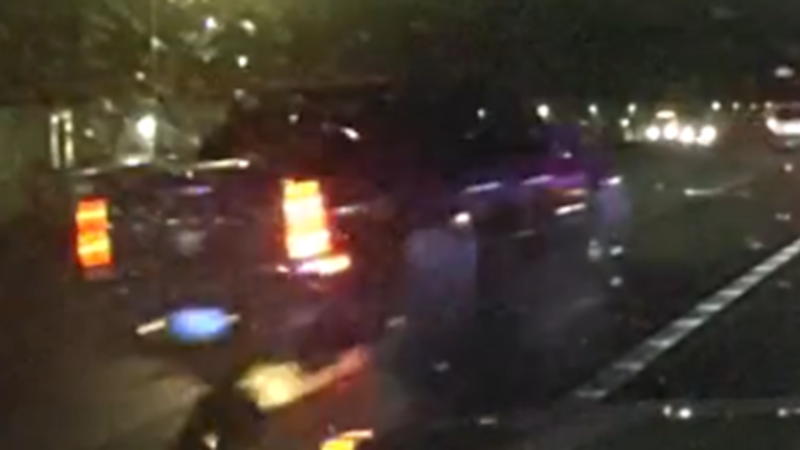RENTON, Wash. — After nearly a day and failed attempts by the Washington Fish and Wildlife Department, a black bear finally came down from a tree near a Renton elementary school overnight.
The bear stayed in one tree, and then another for about 20 hours Wednesday overnight into Thursday. See close-up photo of the bear here.
After 10 p.m., the bear climbed down the tree but then climbed up another tree. Wildlife officials left Wednesday night, thinking the bear could come down on its own.
It eventually came down at about 3:20 a.m. Thursday and ran into the woods.
On Wednesday, crews were called around noon to the tree located in a park with a tennis court, which is about a block away from Highlands Elementary School. Children were kept inside at recess and released slightly earlier than usual on Wednesday.
Animal control officers tried to shoot bean bags at the bear in hopes of bringing it down and tranquilizing it.
Officers only use the tranquilizer when bears are closer to the ground, so they were unable to use tranquilizer darts while it was in the tree.
Wildlife officials wanted to get the nearly 200 pound bear down from the tree and relocate it away from the neighborhood, but they were not at the scene overnight.
The animal control officers' efforts appeared to make the bear climb higher in the tree. It fell down several limbs just before 5 p.m., and then again tried to climb higher in the tree.
KIRO 7 News spoke to Nadine Drisseq with King County's "Bear Smart" program. She said during the spring season the bears are losing calories until berries become available. This bear likely came for food, but it scurried up the tree out of fear.
“There were garbage totes [cans] all around,” Drisseq said. “I think people have taken them in now. It’s garbage day, and he’s been lured here.”
Drisseq's Bear Smart program worked on a 2016 study that looked into residential garbage bins attracting bears.
The study claims that once a bear gets a taste of human garbage they can become "food conditioned" and continue a habit of searching for food in garbage cans.
According to the study, the so-called "food conditioning" is dangerous for both community and the bear as it can become more aggressive in its search for food.
Here's what to do if you come in close contact with a bear:
- Stay calm and avoid direct eye contact, which could elicit a charge. Try to stay upwind and identify yourself as a human by standing up, talking and waving your hands above your head.
- Do not approach the bear, particularly if cubs are present. Give the bear plenty of room.
- If you cannot safely move away from the bear, and the animal does not flee, try to scare it away by clapping your hands or yelling.
- If the bear attacks, fight back aggressively. As a last resort, should the attack continue, protect yourself by curling into a ball or lying on the ground on your stomach and playing dead.
In Washington, black bears live in a diverse array of forested habitats, from coastal rainforests to the dry woodlands of the Cascades' eastern slopes.
Sightings of bears happen across the eastside region from Bothell down to Auburn, especially at homes near densely wooded areas.
The statewide black bear population in Washington likely ranges between 25,000 and 30,000 animals. Bear attacks are rare, although the chances of being injured by one multiply in the backcountry.
The Department of Fish and Wildlife responds to bear sightings when there is a threat to public safety or property. If it is an emergency, dial 911.
Cox Media Group





